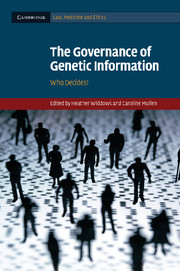Book contents
- Frontmatter
- Contents
- Notes on contributors
- Preface
- Introduction
- SECTION I Problematising governance of genetic information
- SECTION II Ethical frameworks of governance
- SECTION III Redesigning governance
- 7 Involving publics in biobank governance: moving beyond existing approaches
- 8 Genetic information and public opinion
- 9 Harmonisation and standardisation in ethics and governance: conceptual and practical challenges
- Bibliography
- Index
9 - Harmonisation and standardisation in ethics and governance: conceptual and practical challenges
Published online by Cambridge University Press: 02 February 2010
- Frontmatter
- Contents
- Notes on contributors
- Preface
- Introduction
- SECTION I Problematising governance of genetic information
- SECTION II Ethical frameworks of governance
- SECTION III Redesigning governance
- 7 Involving publics in biobank governance: moving beyond existing approaches
- 8 Genetic information and public opinion
- 9 Harmonisation and standardisation in ethics and governance: conceptual and practical challenges
- Bibliography
- Index
Summary
Due to the proliferation of … databases, the question of international coordination and organization arises, both on a scientific and ethical level … harmonization has therefore become a priority, although it poses significant challenges.
Calls for harmonisation in ethics and law are becoming increasingly common. Our focus here is on harmonisation in ethics, including ethics as a governance tool: what does it mean and is it possible and desirable? How does harmonisation relate to standardisation? The Concise OED definition explains harmonisation as the process of making a system consistent. In ethics, this is typically understood in terms of the production of a system of concepts/principles that may be universally/globally applied.
But why the focus on harmonisation? Harmonisation may be sought by people with different meta-ethical commitments: both by those who subscribe to a notion of moral truth to be discovered, and by those who think morality is to be established by agreement. There may, however, be different immediate prompts for the search. One is a direct response to the process of globalisation, broadly understood; or to a particular aspect of this, namely concern about the global impact of developments in technoscience – arising out of concerns, for example, that attempts to regulate such developments in one society will be useless if they can be carried out with impunity elsewhere. Specifically, we are concerned here with calls for harmonisation in relation to a particular development in biotechnology: the networking of different national initiatives in biobanking and biological resources.
Information
- Type
- Chapter
- Information
- The Governance of Genetic InformationWho Decides?, pp. 201 - 213Publisher: Cambridge University PressPrint publication year: 2009
Accessibility standard: Unknown
- 5
- Cited by
